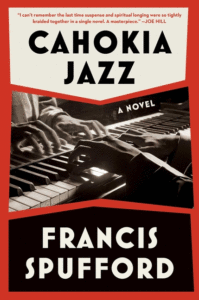
Sheila Heti’s Alphabetical Diaries, Francis Spufford’s Cahokia Jazz, and Bob Stanley’s The Story of The Bee Gees all feature among the Best Reviewed Books of the Week.

1. Cahokia Jazz by Francis Spufford
(Scribner)
13 Rave • 1 Positive • 2 Mixed
“One of the signal achievements of this exceptional novel is the generosity and rigour with which it conjures up Cahokia. Spufford’s creation absolutely feels like a place you could visit, or could have visited, if you happened to be travelling westward across the United States in the year of modernism, 1922. Spufford has imagined a history, a culture, a full suite of territorial and ethnic tensions; he even knows when and where the Cahokian trains run. And every detail is pertinent to his beautifully buttoned-up plot. And there is no clumsy expository dialogue.”
–Kevin Power (The Irish Times)

2. Ordinary Human Failings by Megan Nolan
(Little Brown and Company)
10 Rave • 2 Positive • 2 Mixed
“Nolan begins by embracing the genre’s major tropes (dead child, plucky journalist, family secrets) only to turn their governing logics against them with prosecutorial persistence and precision. This is a murder mystery in which there is little mystery about the murder, a page-turner in which the suspense hinges less on what happened than on how and why certain people become the people to whom such things happen … Nolan’s prose is clean and exacting, with an almost clinical interest in the power of shame: class shame, sexual shame, national shame, the shame of the addict. It seems to rank high among Nolan’s writerly principles that the cure for shame is honesty, however ugly the truth is … Nolan’s vision is grim but not hopeless, unflinching yet uncynical.”
–Justin Taylor (The Washington Post)
3. Corey Fah Does Social Mobility by Isabel Waidner
(Graywolf)
8 Rave • 1 Positive
Read an excerpt from Corey Fah Does Social Mobility here
“Sometimes surreal satires can be inaccessible, too clinically strange to connect with, but Waidner anchors the reader with familiar emotion … Waidner’s humor is similarly accessible — playful and unpretentious; and their prose, despite being peppered with foreign phrases and grammatical oddities, is disarmingly smooth … The novel is an allegory that argues, effectively, that admission is not the same thing as access … Poignant.”
–Ainslie Hogarth (The New York Times Book Review)
**
1. The Story of the Bee Gees: Children of the World by Bob Stanley
(Pegasus)
3 Rave • 3 Positive • 1 Mixed
“[A] definitive group biography … This book, like the others, is both a fanboy’s love letter and a detailed, what-did-they-take-with-their-tea account of the musicians’ daily lives … By the end, the brothers become a microcosm of everything that happened in the 20th-century pop world.”
–David Kirby (The Washington Post)
2. Alphabetical Diaries by Sheila Heti
(Farrar, Straus and Giroux)
3 Rave • 3 Positive • 2 Mixed • 1 Pan
“Powerful and intimate … The book is made up of Heti’s frank, funny, filthy and casually philosophical diaries, 10 years of them … The effect is riveting … I found reading Alphabetical Diaries to be a profound experience, perhaps even more so than her novels … There is something of Anaïs Nin’s journals in Alphabetical Diaries, and of Iris Murdoch’s letters, and of Edna O’Brien’s memoirs. Something locked-in and bristling. Heti is wrestling openly with the things that matter.”
–Dwight Garner (The New York Times)

3. The Bishop and the Butterfly: Murder, Politics, and the End of the Jazz Age by Michael Wolraich
(Union Square & Co.)
2 Rave • 3 Positive
“Wolraich’s account of the murder and the ensuing investigations, helmed by the former judge Samuel Seabury…is brick-dense yet propulsive. Unlike the sensationalist reporters of the era, Wolraich manages to handle even the seediest of underworlds with reportorial spareness and elegance, treating his material more as a nonfiction political thriller than a true-crime whodunit … The book also provides a fascinating portrait of Franklin Delano Roosevelt, then New York’s governor, as he navigated the fallout from Gordon’s murder and the public’s demands to clean up the state’s snakes’ nests … Equally unnerving is the book’s reminder of how infrequently and unevenly justice is meted out. While Wolraich justifiably marvels that Gordon’s murder led to the collapse of Tammany, this posthumous triumph was qualified by the fact that Gordon’s actual killers were exonerated by a jury.”
–Lesley M. M. Blume (The New York Times Book Review)
 Image by Gerd Altmann from Pixabay[/caption]
Image by Gerd Altmann from Pixabay[/caption]

